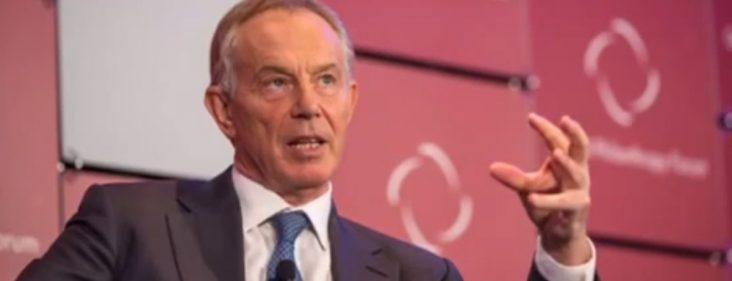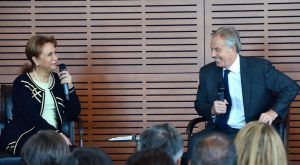Former UK prime minister tells Little Rock audience that a radical center needs to rise
by July 15, 2016 4:32 pm 234 views

Former British Prime Minister Tony Blair called for a more active and aggressive political center and said the recent vote by British citizens to leave the European Union was a protest vote that has negative consequences.
Blair responded to questions by former U.S. Secretary of Labor Alexis Herman at the Clinton Presidential Center as part of the Frank and Kula Kumpuris Distinguished Lecture Series. After Blair’s talk, former President Bill Clinton gave a brief impromptu speech extolling the virtues of cooperation.
Blair said political figures have become more fragmented while exploiting voter anger. He worried that “populist experiments” might now take hold, becoming uglier as their promised solutions don’t work “because actually they never really were solutions in the first place.”
Blair said political centrists instead should provide sensible but radical solutions. He said the center left and center right have much in common.
“I think the center ground’s got to get more muscular, and it’s got to stand up,” he said. He said people in his position have become “too complacent, too much about managing the status quo.”
Blair said the recent vote by Great Britain to leave the European Union was caused by a sense of alienation and a belief that the political elite is out of touch with the people. Social media allows such insurgent movements to grow in scale and speed. He said the issue of Europe has always been controversial in Britain. Likewise, many European countries could also vote on independence, and it would be an open question as to what would happen.
“A lot of people voted as a protest. But the fact is, it wasn’t a protest. It was a decision,” he said.

That decision had consequences, he said, explaining that the British economy has suffered, the pound had dropped 11%, the country could go into a recession, and Scotland could have another referendum on whether or not to leave the U.K. Blair said these events have confused even him.
“One thing that’s been quite humbling for me and interesting and somewhat discomforting has been the degree to which having spent a lifetime in politics, and thinking, you know, I was quite good at it, I’m wondering am I understanding it?” he said.
Blair said politics has become more partisan during his political career, explaining that, in days gone by, most Brits watched the BBC’s 10 o’clock news, which formed the basis of the conversation. Since then, media outlets have become more fragmented and partisan, keeping their constituencies angry in order to hold onto them. That was followed by the rise of social media – which he said he originally thought might civilize the discourse. He was wrong.
“What that does is it then augments that sense, right? Here’s my tribe. That’s where I belong. That’s what we think, and we’re not interested in a conversation with you because actually making you our enemy makes us feel good about ourselves,” he said.
Blair said his time since leaving office is being spent on making globalization work “because I believe that globalization is a force that is represented by people and by technology and by changes in the world. It’s not really a policy driven by government, so it’s a fact.”
Speaking the day after the terrorist attack in Nice, France, that killed at least 84 people celebrating Bastille Day, Blair said dealing with religious extremism involves issues of security and providing an education that combats the teachings of radical Islamic schools. He said the number of actual terrorists number in the tens of thousands, but radical clerics have millions of followers. Terrorists like the Islamic State cannot be allowed to hold territory, he said, because then the presence of a caliphate becomes a recruiting mechanism. He said the West must build alliances with the Muslim world, adding that most terrorist victims are Muslim.
Blair said the Israeli-Palestinian conflict is a key to addressing extremism because its presence encourages it. He said an opportunity for progress in the Middle East exists because Arabs and Israelis now share many of the same interests, such as fear of Iran. Moreover, some new leaders in Persian Gulf states seem interested in making progress. He said he is about to make his 182nd visit to Israel since leaving office, and that he has more of an understanding of the region’s issues now than when he was prime minister.
On Thursday, Blair appeared in Little Rock with former presidents Clinton and George W. Bush, both of whom were political allies of his. While the two are very different, he said there are points where they come together.
“Both will stand up for sensible positions on immigration, which I personally think is very important,” he said. “Both are against isolationism. Both are in favor of an economy that is interdependent.”
Afterward, Clinton told the audience he had opposed the British exit from the European Union because it would increase dysfunction and reduce cooperation “at a time when the last thing we need is something else that doesn’t work as well as it used to work.”
He pointed to a book by Edward Wilson, “The Social Conquest of Earth,” which he said is the “best political book I’ve read, I know in a decade.” It said that ants, termites, bees and people dominate the planet because they adapt and cooperate. He said the world is “in the growing pains of globalization.”
“It is really important to make sure that every time you hear somebody tell a bad story, you’ve got a good one,” he said.
